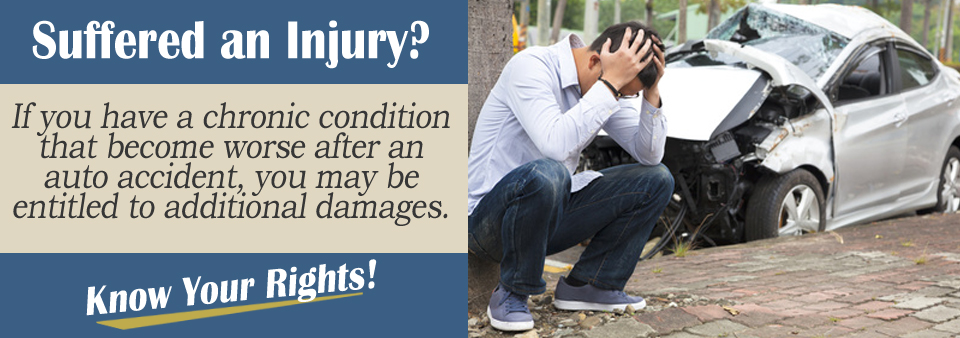If you have been injured in a car accident and already had a preexisting injury or condition prior to your car accident, you might be wondering how your injury will affect your chances of being compensated for your new injury. The fact that you had a condition prior to your accident will not bar your ability to seek an award for damages. It might change the amount you receive, however, and will change the way the courts determine the value of your injury.
We have asked attorney, Alaina Sullivan, about what you should do. Here is what she had to say:
The Eggshell Plaintiff
No, you are not Humpty Dumpty. What the "eggshell plaintiff" means is the defendant must take the victim as he finds them. They do not get to pick their plaintiff. The victim of a car accident could be someone of good health who walks away easily from the incident, or it could be more fragile and susceptible to injuries. The victim may be driving with an already broken arm from a previous accident, but the impact from the later car accident exacerbated the previous injury, requiring surgery for repairs. However, the defendant cannot use this against you. The eggshell plaintiff rule requires the court to take the plaintiff as he or she is regardless.

Insurance Mitigation
Despite the eggshell plaintiff rule, the insurance company is going to do everything possible to mitigate what they must pay. That means you should expect them to try to dig up your past medical history to lower what they will pay. They will also try to minimize their client’s fault in the accident as well. It is all about the money, after all.
Be Honest With Your Attorney
Tell your attorney everything. Attorneys do not like surprises. They will not know you have any preexisting condition unless you bring it to their attention, and if they do know about it, they may be able to ensure that it does not become a problem later.
Preexisting Conditions
You can receive compensation if the accident aggravated or worsened your pre-existing condition. Full disclosure of what injuries or conditions you did suffer from prior to the car accident is important. Otherwise, if the insurance company discovers this information later, they will assume you were deliberately concealing this information. Even if the injuries have absolutely no relation to the one caused by the car accident, you must disclose this information. Hiding it will only cause you to lose credibility in the end.
Drawing the Connection Between the Two
You will need to get a medical opinion stating that there is a causal relationship between the car accident and your injury, and you will also need medical proof that the injury you have following the car accident was not actually the one you had prior to the accident. Go back in your medical records when you were diagnosed with the previous condition and produce these records. Make sure there is a clear picture of where your previous injury ends and the new one begins. Give them to your attorney so that he or she can limit what the other side sees, however.
Medical Authorization Forms
Insurance companies may ask you to sign a medical authorization form allowing them to access your complete medical history. Do not sign this form. It could only give the insurance company evidence to try to use against you, but even more importantly, it is a monumental invasion of privacy. When in doubt, though, ask your attorney. Your attorney can ensure that they only have access to limited records.
Contact an Attorney Today
A licensed personal injury attorney will be able to evaluate your auto accident case and determine if you have a claim against the other party’s insurance company. For the best chance of receiving the compensation you need to pay for medical bills, auto body bills, and pain and suffering, you should speak with a personal injury attorney in your area today.